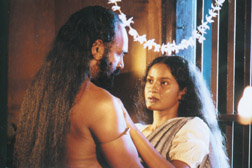|
observer |
|
|
|
|
|
OTHER LINKS |

|

|

|
Film ReviewBherunda Pakshiya:Kandyan past, untold culture
Bherunda Pakshiya, a film based on a historical novel by the award winning author and director, Sarath Dharmasiri, is the cinematic debut of young producer Upul Nishantha. The plot takes place in 19th century Sri Lanka when the British extended the railway lines from Ambepussa to Kandy, through mountains and hitherto untouched Kandyan villages, where the primitive life-style flourished in spite of the dawn of a new era. Besides the breathtaking sceneries of the hill country, Sri Lankan filmgoers have the opportunity of embarking on a journey into a distant history and to get an insight into the primitive Kandyan village and its largely agriculture-based closed economy. The village headman (Sriyantha Mendis) plays a vital role as a ruler, exorcist, and vernacular doctor, thereby exerting an enormous influence over the lives of the ignorant villagers. The polygamous marriage and the institution of family in the ancient context is vividly captured and translated ably into a wholesome cinematic experience by the Director, Sarath Dharmasiri, who has taken great pains in editing each and every footage to suit the plot. Though the village headman is fully contended with his two wives, he constantly worries over the dim prospect of having a child by them. It is obvious that in that primitive society, marriage is not a consensual union between two individuals, but a union that serves the prime motive of bringing up an offspring to carry on the lineage and attend to household needs, including bathing the husband with hot water. Meanwhile, "Punchi Menike", Widane's daughter, comes of age and as suggested by the village headman's aid (Jayalath Manoratne), the village headman begins to develop an attraction to her and wants to marry her (Punchi Menike) as his third wife. However, a youth, a close relation of Punchi Menike, shows an interest in her, and later falls ill, as suggested, due to black magic by the village headman. The same fate befell on the British engineer Thomas who is in charge of the construction of the railway line to Kandy, and was interested in Punchi Menike. Thomas was able to get the consent of both, Punchi Menike and her parents to marry her, but was tragically prevented by an accident that occurred inside the tunnel which is attributed to black magic performed by the village headman who wanted to win over Punchi Menike. Ultimately, the village headman marries Punchi Menike. As a twist of fate, Punchi Menike gives birth to a child, the much-needed offspring to carry on the village headman's lineage, but strangely, with European features. The story ends in a tragic note with the village headman who is wild with rage, jumps onto the approaching train, which, in his madness, and settling of scores with Thomas, he mistook for a powerful animal which could be driven away as he did to the wild elephant, by means of black magic. In the process, the train runs over him amputating a leg. It is a film, which has all the ingredients of a commercial and artistic film. Though a classic, Bherunda Pakshiya is captivating the audience by the panoramic beauty of the hill country and the director, Sarath Dharmasiri should be commended for his effort in creating an interest in Sri Lankan filmgoers in the history of the country, at a time when the youth have little interest in the history. It is obvious that the director had done his share of research into the primitive Kandyan life in the latter part of the 19th century and the people's resistance to the construction of railway lines through their villages encompassing steep mountain ranges, which the villages believe a Herculean task. Director cum author, Sarath Dharmasiri has also made use of the opportunity to highlight the people's beliefs such as exorcism and black magic, which have been effectively exploited by the village headman to achieve his ends and the polygamous marriage in little Kandyan hamlets which are more or less beyond outside influences. The only educated person in the village seems to be the Hamuduruwo (Buddhist priest) who undertakes to teach Sinhala to the British engineer Thomas. Thomas in his broken Sinhala acknowledges Hamudurowo's fluency in English. Sriyantha Mendis, Jayalath Manoratne, Kusum Renu, Jayani Senanayaka, Indika Upamali, Nilanthi Wijesinghe play their roles convincingly, and the foreign actors also play their roles brilliantly and the able director has made use of the talents of each and every actor to suit the plot. Besides a journey into distant history, Beherunda Pakshiya gives a novel cinematic experience that you will never forget. It exposes, willingly or unwillingly, the dark aspects and ruthlessness of the Kandyan society in the latter part of the 19th century. It changes our deep-seated code of morals which most of us have taken for granted, and the remnants of such primitive cultural practices which need to be redefined with a critical eye. It is always prudent for us to criticise our own culture and move on from that point towards a more civilised society where all stakeholders' rights are preserved without being influenced by evil forces. |








